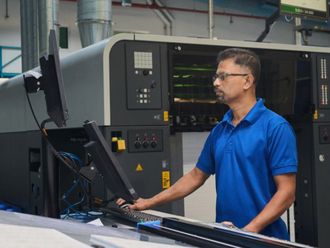Dubai: UAE businesses are in a strong position to capitalise on commercial opportunities created by climate change, a new report by UK Trade and Investment (UKTI) said yesterday.
The study, which was commissioned from the Economist Intelligence Unit, found that 53 per cent of firms in the UAE had been affected by incidences of extreme weather with water resources being of key concern.
A UN study forecasts that between $49 billion (Dh179 billion) and $171 billion will be required annually by 2030 to deal with climate adaptation. "The UK and the UAE have a real commitment to a low carbon future and there are tremendous opportunities [in this field]," said Guy Warrington, British Consul-General in the UAE.
"The adaptation of businesses to climate change is a key driver of profitability The energy sector is the starting point but every sector will be impacted by climate change," he added.
Globally, 31 per cent of those polled said their businesses were actively planning or adapting to climate change in some way. The UAE fared above average with 39 per cent of businesses saying they were adding climate adaptation measures to their continuity plans. "We see a rate of progress in the UAE that is quite stunning," said Keith Clarke, chief executive officer at Atkins, one of the world's largest engineering and design companies.
"If you look at carbon emissions per capita, the UAE is behind [many countries] in the West. But in terms of rate change and awareness of the issue, the UAE is ahead of the US and it is accelerating its position. Masdar City is a classic example because it has moved to a position where it is now the world's most advanced research and development project in urban low-carbon design," he added.
Energy security
Abu Dhabi's Masdar City, a subsidiary of the government-owned Mubadala Development Company, aims to address the issues of climate change and energy security by creating an international hub for sustainable technologies and renewable energy.
Dr Afshin Afshari, Head of Energy Management at Masdar City, said there had been to be consumer acceptance of new technologies that are being developed to combat the threat of climate change.
"New concepts such as car fuel efficiencies and insulated buildings are easy to implement but many people do not do it; this is an issue that needs to be looked at more closely," he said.
"Masdar was about new technologies in the beginning. However, we have started to look at how we can improve the demand of existing products because their optimisation can have a huge impact in terms of achieving zero emissions," he added.
The report by UKTI is based on a survey of more than 700 global executives from a range of sectors from the Middle East and Africa, Western Europe, Asia-Pacific, North America and Latin America.
Study: Key findings
- 53 per cent of companies have experienced an increase in climate impacts on their business.
- 39 per cent are adding climate adaptation measures to their business continuity plans.
- 25 per cent are upgrading their physical assets to cope.












